- Home
- Sherman Alexie
The Lone Ranger and Tonto Fistfight in Heaven: Stories Page 5
The Lone Ranger and Tonto Fistfight in Heaven: Stories Read online
Page 5
“Only the good die young,” my father said.
“No,” my mother said. “Only the crazy people choke to death on their own vomit.”
“Why you talking about my hero that way?” my father asked.
“Shit,” my mother said. “Old Jesse WildShoe choked to death on his own vomit and he ain’t anybody’s hero.”
I stood back and watched my parents argue. I was used to these battles. When an Indian marriage starts to fall apart, it’s even more destructive and painful than usual. A hundred years ago, an Indian marriage was broken easily. The woman or man just packed up all their possessions and left the tipi. There were no arguments, no discussions. Now, Indians fight their way to the end, holding onto the last good thing, because our whole lives have to do with survival.
After a while, after too much fighting and too many angry words had been exchanged, my father went out and bought a motorcycle. A big bike. He left the house often to ride that thing for hours, sometimes for days. He even strapped an old cassette player to the gas tank so he could listen to music. With that bike, he learned something new about running away. He stopped talking as much, stopped drinking as much. He didn’t do much of anything except ride that bike and listen to music.
Then one night my father wrecked his bike on Devil’s Gap Road and ended up in the hospital for two months. He broke both his legs, cracked his ribs, and punctured a lung. He also lacerated his kidney. The doctors said he could have died easily. In fact, they were surprised he made it through surgery, let alone survived those first few hours when he lay on the road, bleeding. But I wasn’t surprised. That’s how my father was.
And even though my mother didn’t want to be married to him anymore and his wreck didn’t change her mind about that, she still came to see him every day. She sang Indian tunes under her breath, in time with the hum of the machines hooked into my father. Although my father could barely move, he tapped his finger in rhythm.
When he had the strength to finally sit up and talk, hold conversations, and tell stories, he called for me.
“Victor,” he said. “Stick with four wheels.”
After he began to recover, my mother stopped visiting as often. She helped him through the worst, though. When he didn’t need her anymore, she went back to the life she had created. She traveled to powwows, started to dance again. She was a champion traditional dancer when she was younger.
“I remember your mother when she was the best traditional dancer in the world,” my father said. “Everyone wanted to call her sweetheart. But she only danced for me. That’s how it was. She told me that every other step was just for me.”
“But that’s only half of the dance,” I said.
“Yeah,” my father said. “She was keeping the rest for herself. Nobody can give everything away. It ain’t healthy.”
“You know,” I said, “sometimes you sound like you ain’t even real.”
“What’s real? I ain’t interested in what’s real. I’m interested in how things should be.”
My father’s mind always worked that way. If you don’t like the things you remember, then all you have to do is change the memories. Instead of remembering the bad things, remember what happened immediately before. That’s what I learned from my father. For me, I remember how good the first drink of that Diet Pepsi tasted instead of how my mouth felt when I swallowed a wasp with the second drink.
Because of all that, my father always remembered the second before my mother left him for good and took me with her. No. I remembered the second before my father left my mother and me. No. My mother remembered the second before my father left her to finish raising me all by herself.
But however memory actually worked, it was my father who climbed on his motorcycle, waved to me as I stood in the window, and rode away. He lived in Seattle, San Francisco, Los Angeles, before he finally ended up in Phoenix. For a while, I got postcards nearly every week. Then it was once a month. Then it was on Christmas and my birthday.
On a reservation, Indian men who abandon their children are treated worse than white fathers who do the same thing. It’s because white men have been doing that forever and Indian men have just learned how. That’s how assimilation can work.
My mother did her best to explain it all to me, although I understood most of what happened.
“Was it because of Jimi Hendrix?” I asked her.
“Part of it, yeah,” she said. “This might be the only marriage broken up by a dead guitar player.”
“There’s a first time for everything, enit?”
“I guess. Your father just likes being alone more than he likes being with other people. Even me and you.”
Sometimes I caught my mother digging through old photo albums or staring at the wall or out the window. She’d get that look on her face that I knew meant she missed my father. Not enough to want him back. She missed him just enough for it to hurt.
On those nights I missed him most I listened to music. Not always Jimi Hendrix. Usually I listened to the blues. Robert Johnson mostly. The first time I heard Robert Johnson sing I knew he understood what it meant to be Indian on the edge of the twenty-first century, even if he was black at the beginning of the twentieth. That must have been how my father felt when he heard Jimi Hendrix. When he stood there in the rain at Woodstock.
Then on the night I missed my father most, when I lay in bed and cried, with that photograph of him beating that National Guard private in my hands, I imagined his motorcycle pulling up outside. I knew I was dreaming it all but I let it be real for a moment.
“Victor,” my father yelled. “Let’s go for a ride.”
“I’ll be right down. I need to get my coat on.”
I rushed around the house, pulled my shoes and socks on, struggled into my coat, and ran outside to find an empty driveway. It was so quiet, a reservation kind of quiet, where you can hear somebody drinking whiskey on the rocks three miles away. I stood on the porch and waited until my mother came outside.
“Come on back inside,” she said. “It’s cold.”
“No,” I said. “I know he’s coming back tonight.”
My mother didn’t say anything. She just wrapped me in her favorite quilt and went back to sleep. I stood on the porch all night long and imagined I heard motorcycles and guitars, until the sun rose so bright that I knew it was time to go back inside to my mother. She made breakfast for both of us and we ate until we were full.
CRAZY HORSE DREAMS
SHE TRIED TO STAND close to Victor at the fry bread stand, but he moved from open space to open space, between the other Indians eating and drinking, while he hoped the Blackfoot waitress would finally take his order. When he grew tired of the chase, he turned to leave and she was standing there.
“They don’t pay you any mind because your hair is too short,” she said.
She’s too short to be this honest, he thought. Her braids reach down to her waist, but on a tall woman they would be simple, insignificant. She’s wearing a fifty-dollar ribbon shirt manufactured by a company in Spokane. He’d read about the Indian grandmother who designs them, each an original, before she sells them for a standard operating fee. He remembered the redheaded bank teller who cashed his check and asked him if he thought her shirt was authentic. Authentic. He stared at this small Indian woman standing in his way and walked past her.
“Hey, One-Braid,” she called after him. “Too good for me?”
“No,” he said. “Too big.”
He walked away, through the sawchips spread over the ground to keep the dust down, down to the stickgame pavilion. He was surprised to see Willie Boyd holding the bones, making gas money for the ride to the next powwow. He dug into his pockets, found a five-dollar bill, and threw it in with Willie. Willie shifted the bones from hand to hand, a Native magician working without mirrors, his hand an inch quicker than the eyes of the old woman sitting on the other side, trying to find the bone with the colored band. The old woman laughed when she guessed wrong, threw a fe
w crumpled bills into the dirt in front of Willie.
“Let it ride all night, Willie,” Victor said. “I ain’t going nowhere.”
It was only the first night of the powwow, everyone had money in their pockets. A five-dollar bill couldn’t mean a thing until the end, when the last van heading out of Browning or Poplar had room for only one more. Willie Boyd drove an RV with a television and a refrigerator, with a sunroof that took in all the air. When it mattered, Victor thought, Willie Boyd would remember that five dollars. Willie Boyd always remembered.
She was standing behind him, again, when he turned to leave.
“You must be a rich man,” she said. “Not much of a warrior, though. You keep letting me sneak up on you.”
“You don’t surprise me,” he said. “The Plains Indians had women who rode their horses eighteen hours a day. They could shoot seven arrows consecutively, have them all in the air at the same time. They were the best light cavalry in the history of the world.”
“Just my luck,” she said. “An educated Indian.”
“Yeah,” he said. “Reservation University.”
They both laughed at the old joke. Every Indian is an alumnus.
“Where you from?” she asked.
“Wellpinit,” he said. “I’m a Spokane.”
“I should’ve known. You got those fisherman’s hands.”
“Ain’t no salmon left in our river. Just a school bus and a few hundred basketballs.”
“What the hell you talking about?”
“Our basketball team drives into the river and drowns every year,” he said. “It’s tradition.”
She laughed. “You’re just a storyteller, ain’t you?”
“I’m just telling you things before they happen,” he said. “The same things sons and daughters will tell your mothers and fathers.”
“Do you ever answer a question straight?”
“Depends on the question,” he said.
“Do you want to be my powwow paradise?”
She took him back to her Winnebago. In the dark, on the plastic mattress, she touched his soft belly. His hands moved over her, fancydancers, each going farther away from his body. He was shaking.
“What are you scared of?” she asked.
“Elevators, escalators, revolving doors. Any kind of forced movement.”
“You don’t have to worry about those kind of things at a powwow.”
“That’s not true,” he said. “We had an Indian conference at the Sheraton Hotel in Spokane last winter. About twenty of us crowded into an elevator to go up to my room and we got stuck between the twelfth and fourteenth floors. Twenty Indians and a little old white elevator man having a heart attack.”
“You’re lying,” she said. “You stole that story.”
“What scares you?” he asked. She was quiet. She stared hard at him, trying to find his features among the shadows, formed a picture of him in her mind. But she was wrong. His hair was thinner, more brown than black. His hands were small. Somehow she was still waiting for Crazy Horse.
“I have this dream about playing bingo,” she said. “It’s a million-dollar blackout and I only need B-6. But the caller announces B-7 and everyone else in the whole damn place is yelling out, Bingo!”
“Sounds more like the truth to me,” he said as she reached across him and turned on the light.
Victor was surprised. She had grown. She was the most enormous woman he had ever seen. Her hair fell down over her body, an explosion of horses. She was more beautiful than he wanted, more of a child of freeway exits and cable television, a mother to the children who waited outside 7-11 asking him to buy them a case of Coors Light. She sat on the bus traveling uptown to a community college. She sat on the bus traveling toward cities that grew, doubled. There was nothing he could give her father to earn her hand, nothing she would understand, remember.
“What’s wrong?” she asked, reaching for the light again, but he stopped her, held her wrist tightly, painfully.
“Why don’t you have any scars?” he asked, pulling her face close to his, her braids touching his chest.
“Why do you have so fucking many?” she asked him.
Then she was afraid of the man naked beside her, under her, afraid of that man who was simple in clothes and cowboy boots, a feather in a bottle.
“You’re nothing important,” he said. “You’re just another goddamned Indian like me.”
“Wrong,” she said, twisting from his grip and sitting up, her arms crossed over her chest. “I’m the best kind of Indian and I’m in bed with my father.”
He laughed. She was silent. She thought she could be saved. She thought he could take her hand and owldance her around the circle. She thought she could watch him fancydance, watch his calf muscles grow more and more perfect with each step. She thought he was Crazy Horse.
He got up, pulled on his Levi’s, buttoned his red-and-black flannel shirt, the kind some writer called an Indian shirt. He stepped into his cowboy boots, opened the tiny refrigerator, and grabbed a beer.
“You’re nothing. You’re nothing,” he said and left.
Standing in the dark, next to a tipi with blue smoke escaping from the fire inside, he watched the Winnebago. For hours, Victor watched the lights go on and off, on and off. He wished he was Crazy Horse.
THE ONLY TRAFFIC SIGNAL ON THE RESERVATION DOESN’T FLASH RED ANYMORE
“GO AHEAD,” ADRIAN SAID. “Pull the trigger.”
I held a pistol to my temple. I was sober but wished I was drunk enough to pull the trigger.
“Go for it,” Adrian said. “You chickenshit.”
While I still held that pistol to my temple, I used my other hand to flip Adrian off. Then I made a fist with my third hand to gather a little bit of courage or stupidity, and wiped sweat from my forehead with my fourth hand.
“Here,” Adrian said. “Give me the damn thing.” Adrian took the pistol, put the barrel in his mouth, smiled around the metal, and pulled the trigger. Then he cussed wildly, laughed, and spit out the BB.
“Are you dead yet?” I asked.
“Nope,” he said. “Not yet. Give me another beer.”
“Hey, we don’t drink no more, remember? How about a Diet Pepsi?”
“That’s right, enit? I forgot. Give me a Pepsi.”
Adrian and I sat on the porch and watched the reservation. Nothing happened. From our chairs made rockers by unsteady legs, we could see that the only traffic signal on the reservation had stopped working.
“Hey, Victor,” Adrian asked. “Now when did that thing quit flashing?”
“Don’t know,” I said.
It was summer. Hot. But we kept our shirts on to hide our beer bellies and chicken-pox scars. At least, I wanted to hide my beer belly. I was a former basketball star fallen out of shape. It’s always kind of sad when that happens. There’s nothing more unattractive than a vain man, and that goes double for an Indian man.
“So,” Adrian asked. “What you want to do today?”
“Don’t know.”
We watched a group of Indian boys walk by. I’d like to think there were ten of them. But there were actually only four or five. They were skinny, darkened by sun, their hair long and wild. None of them looked like they had showered for a week.
Their smell made me jealous.
They were off to cause trouble somewhere, I’m sure. Little warriors looking for honor in some twentieth-century vandalism. Throw a few rocks through windows, kick a dog, slash a tire. Run like hell when the tribal cops drove slowly by the scene of the crime.
“Hey,” Adrian asked. “Isn’t that the Windmaker boy?”
“Yeah,” I said and watched Adrian lean forward to study Julius Windmaker, the best basketball player on the reservation, even though he was only fifteen years old.
“He looks good,” Adrian said.
“Yeah, he must not be drinking.”
“Yet.”
“Yeah, yet.”
Julius Windmaker was the la
test in a long line of reservation basketball heroes, going all the way back to Aristotle Polatkin, who was shooting jumpshots exactly one year before James Naismith supposedly invented basketball.
I’d only seen Julius play a few times, but he had that gift, that grace, those fingers like a goddamn medicine man. One time, when the tribal school traveled to Spokane to play this white high school team, Julius scored sixty-seven points and the Indians won by forty.
“I didn’t know they’d be riding horses,” I heard the coach of the white team say when I was leaving.
I mean, Julius was an artist, moody. A couple times he walked right off the court during the middle of a game because there wasn’t enough competition. That’s how he was. Julius could throw a crazy pass, surprise us all, and send it out of bounds. But nobody called it a turnover because we all knew that one of his teammates should’ve been there to catch the pass. We loved him.
“Hey, Julius,” Adrian yelled from the porch. “You ain’t shit.”
Julius and his friends laughed, flipped us off, and shook their tail feathers a little as they kept walking down the road. They all knew Julius was the best ballplayer on the reservation these days, maybe the best ever, and they knew Adrian was just confirming that fact.
It was easier for Adrian to tease Julius because he never really played basketball. He was more detached about the whole thing. But I used to be quite a ballplayer. Maybe not as good as some, certainly not as good as Julius, but I still felt that ache in my bones, that need to be better than everyone else. It’s that need to be the best, that feeling of immortality, that drives a ballplayer. And when it disappears, for whatever reason, that ballplayer is never the same person, on or off the court.
I know when I lost it, that edge. During my senior year in high school we made it to the state finals. I’d been playing like crazy, hitting everything. It was like throwing rocks into the ocean from a little rowboat. I couldn’t miss. Then, right before the championship game, we had our pregame meeting in the first-aid room of the college where the tournament was held every year.

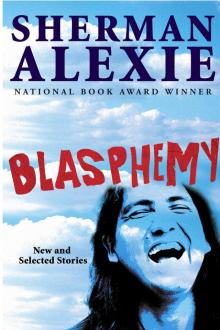 Blasphemy: New and Selected Stories
Blasphemy: New and Selected Stories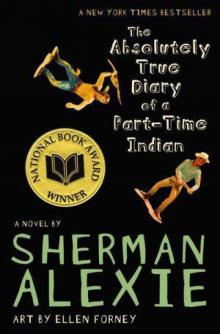 The Absolutely True Diary of a Part-Time Indian
The Absolutely True Diary of a Part-Time Indian Flight
Flight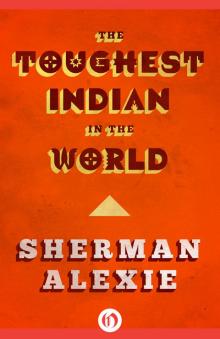 The Toughest Indian in the World: Stories
The Toughest Indian in the World: Stories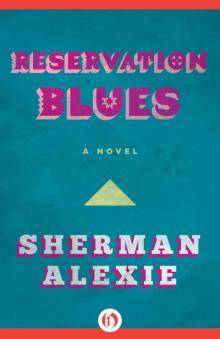 Reservation Blues
Reservation Blues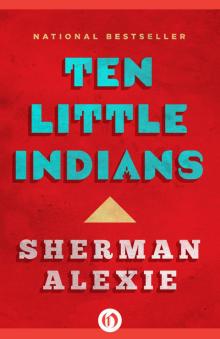 Ten Little Indians: Stories
Ten Little Indians: Stories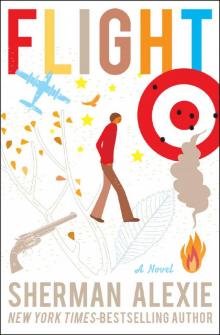 Flight: A Novel
Flight: A Novel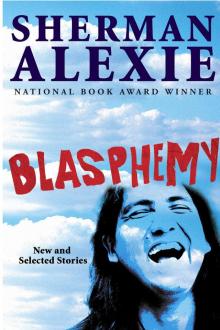 Blasphemy
Blasphemy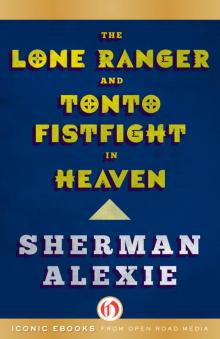 The Lone Ranger and Tonto Fistfight in Heaven
The Lone Ranger and Tonto Fistfight in Heaven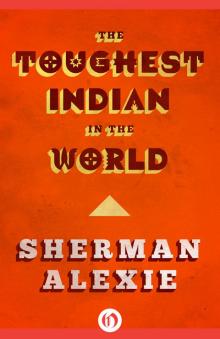 The Toughest Indian in the World
The Toughest Indian in the World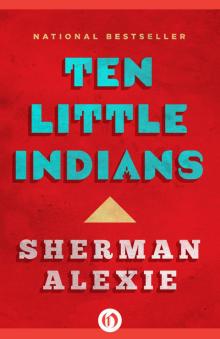 Ten Little Indians
Ten Little Indians